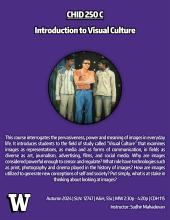Tomorrow marks the beginning of May, which means Autumn 2024 registration is near (we can't believe it either😮💨)
Per usual, we have a bunch of courses for y'all to window-shop before it's your time to grab a seat.
Poetry📒 Ghosts👻 Science🤖: CHID's got you covered.
___
Autumn 2024 Offerings:
CHID 201A: Radical Poetics
This course is just what the title claims, a deep dive into the radical poetic innovations of, in this case, BIPOC poets. Understand, this is not simply a course in ‘close reading’ poems in isolation, although that skill will certainly be important at times, and you will be given instruction in basic close reading upfront. After that introduction, the course will turn its attention to understanding poetic forms, exploring how many of our poets have spent considerable time revisiting major poetic conventions, such as the sonnet and the aubade, in response to important historical events and pressing political questions.
CHID 206A: Violence and Contemporary Thought - Antisemitism, Racism, and Historical Memory after Auschwitz
Historical exploration of intellectual, literary, and artistic responses to the problem of modern mass violence through comparative study of the legacies of the Holocaust and European colonialism. Crosslisted with JEW ST 206 / HSTCMP 206.
CHID 210A: The Idea of the University - Ways of Learning, Exploring, and Knowing
Is the university a refuge or a site of discipline? Is it an agent of colonialism, capitalism, and the state? Or is it the crucible for social change and resistance? Is it all of these things? Can it be something else? This course examines the university as simultaneously a crime scene, a site for healing, and a place for transformation. In examining “the idea of the university,” this course engages with scholars across the arts and sciences and pays special attention to the contributions of Black, Indigenous, and other radical intellectual traditions.
CHID 250C: Introduction to Visual Culture
This course interrogates the pervasiveness, power and meaning of images in everyday life. It introduces students to the field of study called “Visual Culture” that examines images as representations, as media and as forms of communication, in fields as diverse as art, journalism, advertising, films, and social media. Why are images considered powerful enough to censor and regulate? What role have technologies such as print, photography and cinema played in the history of images? How are images utilized to generate new conceptions of self and society? Put simply, what is at stake in thinking about looking at images?
CHID 390A: Haunting, Horror, and Other Stories
The seminar invites students to consider haunting, horror, and ghosts as entry points into discussions about politics, culture, violence, and power. What do Indigenous zombie films tell us about colonialism? How might horror films speak to misogyny, political, and racial violence? Can we think about haunting as anti-colonial practice? What can Dracula and Frankenstein tell us about the anxieties of modern capitalism? Students will engage critically with academic texts, films, fiction, art, and other mediums, and will have the opportunity to work on a research project related to the themes of the course.
CHID 395B: World Building in the Arts, Sciences, and Humanities
Our world is in trouble. Problems caused by systemic inequities based on race, gender, and ability still constrain human relationships, while seemingly new problems, such as global warming, proceed faster than previously imagined. Making things even worse, our attempts to create better futures through innovation often end up exacerbating the problems that they were meant to address. How can we as designers, artists, scholars, and activists engage our world in a way that effectively harnesses the power of our imaginations to rethink not only what we can create but change the ways we have of creating?
CHID 444A: Eye + Mind
This class investigates life as an emergent phenomenon across the disciplines of biophilosophy, art, art history, literary criticism, and information studies. Students will read key texts from these disciplines, evaluate recent art commenting on bioinformatics, and design their own creative projects. Throughout the quarter we will ask questions such as: What do art and science have in common? What is an emergent phenomenon? What is special about living things? Students should expect to leave this class with knowledge of key issues in phenomenological philosophy, bioart, biophilosophy, postcolonial, and complexity studies.
___
More courses to come!
